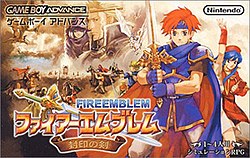List of Fire Emblem: Fūin no Tsurugi characters
| Fire Emblem: The Binding Blade | |
|---|---|
 |
|
| Developer(s) | Intelligent Systems |
| Publisher(s) | Nintendo |
| Director(s) | Tōru Narihiro |
| Producer(s) | Takehiro Izushi |
| Designer(s) | Masayuki Horikawa |
| Programmer(s) | Takafumi Kaneko |
| Artist(s) | Eiji Kaneda |
| Writer(s) | Masayuki Horikawa Kouhei Maeda |
| Composer(s) | Yuka Tsujiyoko |
| Series | Fire Emblem |
| Platform(s) | Game Boy Advance |
| Release date(s) |
|
| Genre(s) | Tactical role-playing |
| Mode(s) | Single-player |
| Review scores | |
|---|---|
| Publication | Score |
| Famitsu | 36/40 |
| RPGamer | 3.5/5 |
| RPGFan | 87% |
Fire Emblem: The Binding Blade(Japanese: ファイアーエムブレム封印の剣 Hepburn: Faiā Emuburemu: Fūin no Tsurugi?) is a tactical role-playing game developed by Intelligent Systems and published by Nintendo for the Game Boy Advance (GBA) handheld video game console. It is the sixth entry in the Fire Emblem series, the first title to be developed for the system, and the first title to appear on a handheld console. It was released in Japan in March 2002.
Set on the fictional continent of Elibe, a continent dominated by humans in the wake of a war between humanity and dragons long ago. The story follows Roy from the small country of Pherae as he leads a growing army against the forces of King Zephiel of the kingdom of Bern, who is gradually taking over Elibe. As with other Fire Emblem games, battles take place on a grid-based map, with player units assigned character classes taking part in single combat with enemies and being subject to permanent death if defeated.
The Binding Blade began development as a Nintendo 64 title called Fire Emblem: Maiden of Darkness, but internal changes at the company caused development to shift drastically, leading to the original version's cancellation and a new version being developed for the GBA. Beginning development in 2001, one of the main goals for the developers was to make the game more forgiving to newcomers than the notoriously difficult Fire Emblem: Thracia 776. Upon release, it was praised by critics and sold over 340,000 units. Despite never releasing overseas, Roy's appearance in Super Smash Bros. Melee contributed to the localization of its prequel, released overseas as Fire Emblem.
...
Wikipedia
